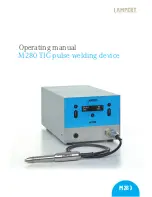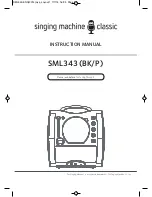
Version February 2022
8
EN
HÜRNER EasyWeld 110 (T) User’s Manual
H Ü R N E R S c h w e i s s t e c h n i k G m b H
Nieder-Ohmener Str. 26
35325 Mücke, Germany
Complaints at a later point may no longer be eligi-
ble for remedy.
3.3
Technical Specifications
EasyWeld 110 (T)
Operating range
Suitable materials
Power supply of facing tool/heating elem.
Carriage stroke
EasyWeld 110 model version
EasyWeld 110 T model version
Pwr input heating elem./facing tool
Dimensions of machine on base plate
EasyWeld 110 model version
EasyWeld 110 T model version
Weight of machine excluding base plate
Overall weight all components in box
EasyWeld 110, manual facing tool
EasyWeld 110, power facing tool
EasyWeld 110 T
Supplied reducer inserts
O.D. 20 - 110 mm
with tees up to 90 mm
PE, PP, and PVDF
230 V, 50/60 Hz
129 mm (5
⅛
")
179 mm (7")
800 W and 560 W
492.5 x 350 x 178 mm (19
⅜
x 13¾ x 7")
622 x 350 x 178 mm (24½ x 13¾ x 7")
approx. 9,2 kg (20.3 lbs.)
44.2 kg (97¼ lbs.)
45.4 kg (100 lbs.)
55 kg (121 lbs.)
20, 25, 32, 40, 50, 63, 75, 90 mm
4
Principle of Operation
4.1
General Information
The heating element butt-welding process is a type of joint
in which two components are plasticized by contact with a
heating element and then pressed together with a defined
force. The seamless joint is achieved through allowing them
to cool. It includes the following operating steps:
• If the components to be jointed are of a smaller diame
-
ter than the size of the clamps, the appropriate reducer
inserts are installed in the clamps.
• The clamps are prepared for the desired joint: straight
or elbow of one of the available angles.
• The components are secured in the clamps and aligned
to each other.
• The butts of the pipes/fittings are faced and when fac
-
ing is completed, the butts are checked for proper align-
ment.
• The butts of the components are pressed against the
heating element, to be heated as defined by the appli-
cable welding time.
• The heating element is removed from in-between the
components and both, pipes or fittings, are pressed
against each other under the defined force and allowed
to cool down.
Important
No external forces must be applied prior to the com-
ponents having completely cooled down.
















































